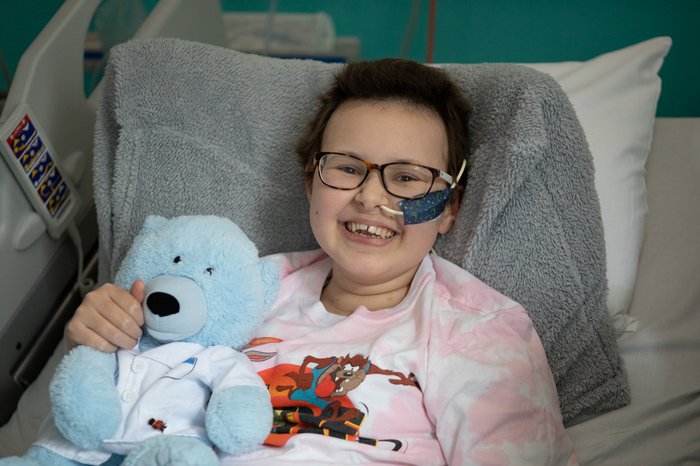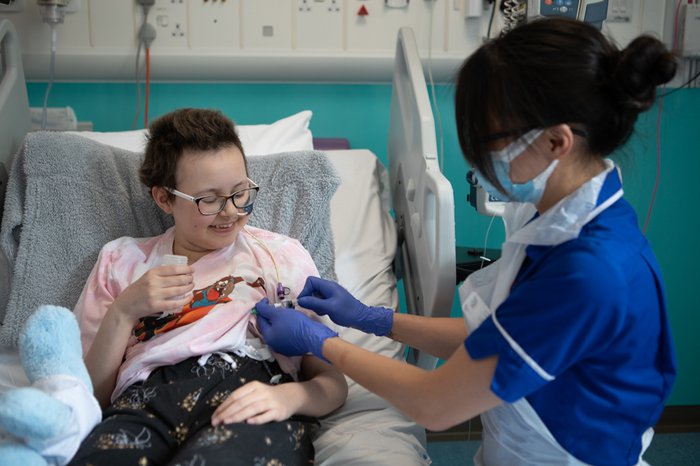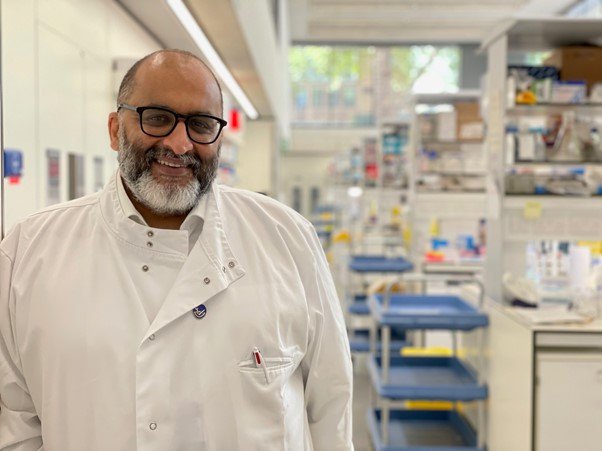New ‘universal approach’ therapy for leukaemia shows promise during world-first trial
Blood Cancer UK was proud to fund the lab studies that directly led to this life-changing trial which could broaden the number of people who benefit from this type of therapy in future.
Researchers from Great Ormond Street Hospital NHS trust shared results of a world-first use of a base-edited cell therapy approach on a 13- year-old. Blood Cancer UK funded the pre-clinical phase of the research, led by Prof Waseem Qasim at UCL. The news comes as researchers gather at the American Society of Haematology (ASH) conference taking place in the US (Sunday 11 December).
CAR-T cells are already an important treatment for some types of blood cancer that are hard to treat and affect an immune cell called a B cell. Unfortunately, up until now they haven’t been useful at treating blood cancers that affect T cells. This is because instead of targeting the cancerous cells, the CAR-T cells turn on each other and destroy one another before they have a chance to destroy the leukaemia.
The work Blood Cancer UK funded, involved identifying a way to modify CAR-T cells that are produced in the lab that shields them from attacking each other and instead allows them to just seek out and destroy the cancerous leukaemia cells.
Who was treated in this trial?
Alyssa, a 13-year-old, was diagnosed with a form of blood cancer called T-cell acute lymphoblastic leukaemia in 2021.
Initially she was treated with all current conventional therapies for blood cancer - the UK’s fifth most common cancer - including chemotherapy and a bone marrow transplant. Unfortunately, her disease came back and there were no further treatment options.
However, Alyssa, was the first person to be enrolled onto this clinical trial where she received ‘universal’ CAR T-cells that had been pre-manufactured from a healthy volunteer donor.
Blood Cancer UK’s funding of the lab-based research was a crucial step in getting this ground-breaking approach trialled for people like Alyssa
Just 28 days later, she was in remission and went on the receive a second bone marrow transplant to restore her immune system. Now, six-months later, she is doing well at home recovering with her family.
How does this new approach work?
Conventional CAR-T therapy works by taking some T cells (blood cells that help to protect you from infection and disease) out of your blood and genetically modifying them in a lab so they can seek out and destroy cancer cells. These cells are then given back to the patient to fight the cancer.
However, this approach is done for every patient individually and doesn’t work for everyone, including people with T cell blood cancers as the CAR-T cells attack each other, instead of destroying the cancerous T cells.
In the research funded by Blood Cancer UK, Professor Qasim identified a way to modify CAR-T cells that shields them from attacking each other and instead allows them to just seek out and destroy the cancerous leukaemia cells.
This new ‘universal’ treatment would be more “off the shelf” and remove the need to take cells, edit them in the lab and give them back to the person for every round of treatment.
What is happening with this clinical trial?
The clinical trial for this treatment is currently open for people enrolled on NHS and aims to recruit ten patients with T-cell leukaemia who have exhausted all conventional treatment options. Any patients eligible to receive treatment under the NHS and interested in this trial should talk to their specialised healthcare professionals.
If shown to be widely successful, the hope is that this treatment could be offered to children earlier in their treatment journey when they are less sick.
Helen Rowntree, Chief Executive of Blood Cancer UK, said:
“The results of this early-phase clinical trial are hugely exciting, and show that research into blood cancer, the fifth most common cancer in the UK, can continue to improve outcomes for people living with the condition. Blood Cancer UK’s funding of the lab-based portion of this research identified a way to modify CAR-T cells, allowing them to just seek out and destroy the cancerous leukaemia cells was a crucial step in getting this ground-breaking approach trialled in people like Alyssa off the ground.
“This ‘universal’ approach using specialised cells, and if proven successful, this approach could reduce the length and cost of the current process and could broaden the number of people who receive this type of treatment.
"For Alyssa, and her family the success of this approach has been transformative and we’re delighted to hear that her cancer is now in remission. We will need to see how this trial continues to progress over the next few years, in order to give those with blood cancer who could benefit from it the assurances it will work."
“With innovative research like this, we will bring forward the day when no more lives are lost from blood cancer.”
Want to hear about more ground-breaking research?
Join our mailing list to get news like this delivered direct to your inbox.
We will keep you updated about our work and the ways you can help, including campaigns and events. We promise to respect your privacy and we will never sell or swap your details.



